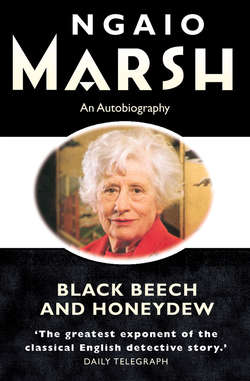Читать книгу Black Beech and Honeydew - Ngaio Marsh, Stella Duffy - Страница 13
CHAPTER 3 School
ОглавлениеSt Margaret’s College was only six months old when I became a pupil there. It was one of a group of schools established in the Dominions by the Kelburn Sisters of the Church, an Anglo-Catholic order of nuns. These ladies already conducted St Hilda’s College in Dunedin. With funds raised by their Colonial exertions they supported their work amongst the poor in the East End of London.
On the face of it, the choice of St Margaret’s would seem to have been an odd one on the part of my parents. My mother certainly respected and subscribed to the Anglican faith but she was not an ardent churchwoman. Occasionally she would let fall a remark that suggested not doubt so much as a sort of ironical detachment. ‘Apparently,’ she once said, ‘the Almighty can see everything except a joke.’
This was not the sort of quip that would have gone down well at St Margaret’s.
As for my father, he seldom missed an opportunity of pointing out the devastation wrought by ‘religion’ (usually undefined) upon the progress of mankind. He would invite my mother and me to look at the Crusades. ‘Bloodiest damn’ business in history. Look at Evolution! You want to read. Read Haeckel!’ he would shout. ‘Or Darwin. Or Winwood Reade. They’ll show you.’
My mother had hidden Haeckel’s Evolution of Man in the lockers under the living-room windows, mainly, I suppose, because of its rather surprising illustrations. There it lay, cheek-by-jowl with Three Weeks. These were the only books that were ever withdrawn from my attention, and I found them both in due course. I was but mildly engaged by the first, thought the second pretty silly and didn’t get farther than the first chapter of either. She needn’t have bothered.
It does seem strange that, holding such rationalistic views, my father should have sent me to a school where every possible emphasis was placed upon high-church dogma and orthodox observances. Moreover his attitude to the Sisters, although he occasionally referred to them as Holy-Bolies, was one of amused respect. He did their banking for them and knew their real names. Once, in an absent-minded moment, he let fall to my mother that one of them was a lady of title in her own right. He caught sight of me and was disconcerted.
‘Pay no attention,’ he said, ‘that sort of thing doesn’t matter. I shouldn’t have said anything.’
He made less of class distinctions than anybody I have ever known, not self-consciously, I think, but because they were of no interest to him and he had a talent for forgetting anything that bored him. My mother, nowadays, would probably have been thought of as an ‘inverted snob’, a term which, if it means anything at all, indicates, I imagine, somebody who is inclined to suspect and give battle to snobbish attitudes where none exist. It is true, however, that they both intensely disliked what they considered vulgar turns of speech, oafish manners or slipshod utterance. They came down remarkably crisply if I showed any signs of backsliding in these respects. ‘Rude,’ said my mother, ‘is Never Funny.’ The aphorism was shortened into ‘R is Never F’ and constantly employed.
‘Jump up,’ she would mutter when grown-ups approached, and when they left: ‘Up. Run and open the door.’
‘I was going to!’ I would furiously mutter back, but I jumped to it.
Such was her authority that it involved a trigger-reaction. It was not enough to rise. One leapt.
Perhaps it was because of their views on civilized behaviour that they made what must have been a great sacrifice to send me to St Margaret’s. I took it all as a matter of course but remember now, with something like heartache, how long my mother’s coats and skirts lasted her.
I now realize that she refused many invitations because she had no appropriate dress for the occasion. My father thought she looked beautiful, as indeed she did, but he was vague to a degree about clothes and it never entered his head that she was hypersensitive in matters of economy.
‘Good Lord!’ he would ejaculate on being told the probable cost of some painfully rare necessity. ‘Thirty bob! It can’t be as much as that, can it? Are you sure, Betsy?’
He would grin incredulously at her and she would shrink inside herself and do without. He was far from being ungenerous, but he was singularly blind to certain forms of vulnerability and so, alas, at that time, was his daughter.
Economies that would have seemed irksome to other children were unnoticed by me. I remember how we used to leave the tram (now on an extended route) a half-mile stop before our own because it was the end of a section. My mother was not very robust. She must have often longed for the extra lift. We were, because we had to be so, a thrifty family, and if my parents had been content, as many parents in their circumstances were, to send me to a high school, there would have been a much wider margin for those small luxuries which their friends enjoyed without thinking about the cost.
Having made their decision, they might have settled on one of the other private schools less extreme in their religious attitudes than St Margaret’s and, one would have thought, more acceptable to my father if not to both my parents. Perhaps they considered that the, as it were, personified focus given by a Church school to pure ethics, would be salutary. If so, I think they were right. The fervour, the extremes and the uncertainties of adolescence must find some sort of channel. I took mine out in Anglo-Catholic observance.
